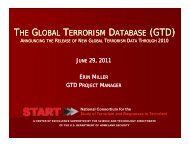Scientific Underpinnings of - START - National Consortium for the ...
Scientific Underpinnings of - START - National Consortium for the ...
Scientific Underpinnings of - START - National Consortium for the ...
Create successful ePaper yourself
Turn your PDF publications into a flip-book with our unique Google optimized e-Paper software.
Stability and <strong>the</strong> State<br />
For states to be stable, <strong>the</strong>y must establish and maintain relations <strong>of</strong> trust with <strong>the</strong>ir citizens.<br />
Citizens’ loss <strong>of</strong> trust in <strong>the</strong> ability <strong>of</strong> <strong>the</strong>ir state to create an inclusive political, social and<br />
economic order made predictable by rule <strong>of</strong> law will erode <strong>the</strong> state’s legitimacy. This erosion<br />
has been characterized by “an increase in illegality, in<strong>for</strong>mality, and criminality in <strong>the</strong> economy;<br />
ineffective delivery <strong>of</strong> basic services; failure to maintain or expand essential infrastructure;<br />
increase in corruption; and appropriation <strong>of</strong> public assets <strong>for</strong> private gain. As a result,<br />
administrative control weakens and <strong>the</strong> bureaucracy is seen as an instrument <strong>for</strong> abuse <strong>of</strong> power,<br />
in turn leading to a crisis in public finances—where both revenue and expenditure are<br />
unpredictable and budgeting becomes an exercise in emergency management.” 1 Ultimately <strong>the</strong><br />
state resorts to using violence internally, and armed groups begin to appear, defying state<br />
authority and taking control <strong>of</strong> sections <strong>of</strong> territory.<br />
State Dysfunction and Regional Instability<br />
The kind <strong>of</strong> instability described above poses pr<strong>of</strong>ound regional and international challenges. For<br />
<strong>the</strong>ir neighbors, such states will be a constant cause <strong>for</strong> concern. Criminal networks will take<br />
advantage <strong>of</strong> such poorly controlled environments, and <strong>the</strong>y will also operate across state borders<br />
through <strong>the</strong> trafficking <strong>of</strong> illicit goods such as drugs and arms, and o<strong>the</strong>r criminal activities. Such<br />
activities subvert rule <strong>of</strong> law and threaten stability in neighbors, particularly neighbors whose<br />
own legitimacy and capabilities are fragile. Ultimately, dysfunctional states may become bases<br />
<strong>for</strong> insurgent groups operating against neighboring states. Insurgents will interact in complex<br />
ways with criminal networks and will engage in criminal activities <strong>the</strong>mselves in order to finance<br />
and equip <strong>the</strong>ir activities. Unless states can be rehabilitated, <strong>the</strong>se dark features <strong>of</strong> globalization<br />
are extremely difficult and expensive to stifle.<br />
The State and Global Challenges<br />
As globalization has accelerated, new threats have arisen. Lessons from <strong>the</strong> first wave <strong>of</strong><br />
globalization would indicate that <strong>the</strong> spontaneous character <strong>of</strong> globalization demands that <strong>the</strong><br />
process be led ra<strong>the</strong>r than treated reactively. In this context, <strong>the</strong> task <strong>of</strong> building effective states is<br />
both more <strong>for</strong>midable and more urgent. In <strong>the</strong> 21 st century, global challenges ranging from<br />
climate change to sustainable energy and food security, to appropriate management <strong>of</strong><br />
international financial markets, all demand marshaling collective resources. Not <strong>the</strong> least <strong>of</strong> <strong>the</strong>se<br />
demands is <strong>the</strong> need <strong>for</strong> political resources, as no single state or group <strong>of</strong> states has <strong>the</strong> capacity<br />
to confront such challenges single-handedly. The task <strong>of</strong> catalyzing <strong>the</strong> emergence <strong>of</strong> effective<br />
states is essential <strong>for</strong> heading <strong>of</strong>f global challenges that threaten stability.<br />
Finally in this context, one <strong>of</strong> <strong>the</strong> key challenges to global stability is <strong>the</strong> arc <strong>of</strong> state dysfunction<br />
itself, given <strong>the</strong> constellation <strong>of</strong> regional and global criminal and military risks, and <strong>the</strong> likely<br />
humanitarian implications <strong>of</strong> ongoing state dysfunction.<br />
The State and <strong>National</strong> Resilience<br />
Citizens across <strong>the</strong> world are exposed daily to an array <strong>of</strong> powerful global <strong>for</strong>ces over which, as<br />
individuals, <strong>the</strong>y exert little influence. An effective state, however, can plan <strong>for</strong> and respond to<br />
<strong>the</strong> impact <strong>of</strong> such <strong>for</strong>ces, whe<strong>the</strong>r through implementing early warning systems and evacuation<br />
procedures <strong>for</strong> hurricanes, through providing reserves <strong>of</strong> food and water to insulate populations<br />
from shortages, maintaining cash reserves, or implementing public health interventions. The<br />
ability to effectively prepare <strong>for</strong> and prevent or mitigate <strong>the</strong> effects <strong>of</strong> a crisis is a key<br />
13





